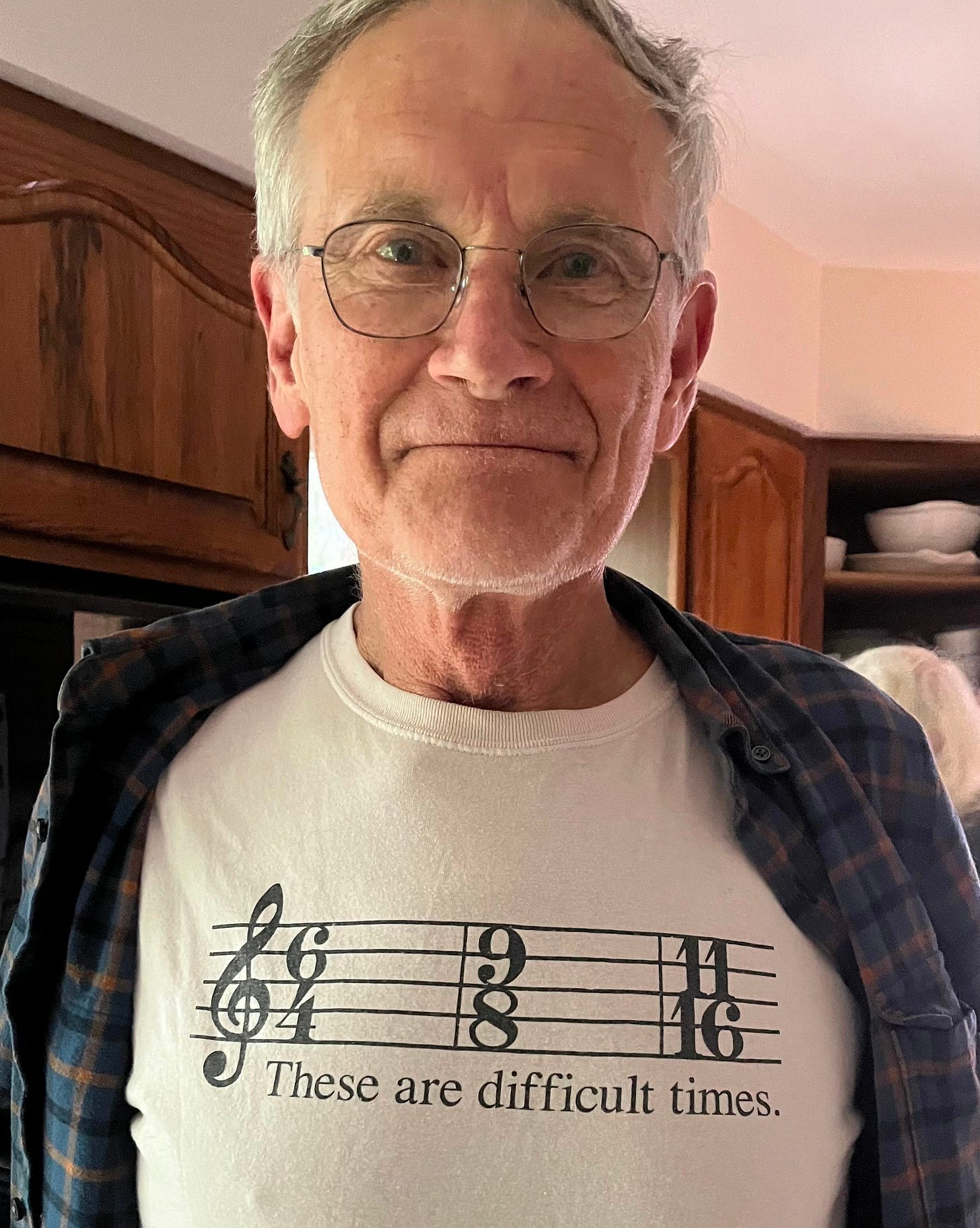How do you know how much is enough?
What Just Happened? May 2025: Balancing boundaries against performance expectations
Time is a robust fiction.
I use this phrase like a mantra to remind myself how brief this moment is, how long and short a single human life will be in the context of the eons of evolution and human civilization.
What is a deadline if not a figment of imagination, amplified beyond the point of significance?
The two things that really matter are the time we spend with the people we love, and the promises we make to each other, and even these may one day break, surrendered to other interests and demands, the inevitable devastation of distraction.
What is a the significance of a newsletter “streak” within the grand scheme, anyway?
And yet, I feel the sting of procrastination in my avoidance of this monthly update, which is already one week overdue.
Last week, my son turned 1,100 days old, the same week Andy and I passed 550 days of daily meditation. (I have learned the hard way that sitting completely still for 20 minutes a day is one of the most transformative things a person can not-do for their mental wellbeing).
Like an inmate scratching days served into a cell wall, each day, I scrawl my son’s age in days alongside the duration of our meditation streak in the top corner of my journal — two small yet important things I am managing (against all odds) to keep alive.
Life on planet earth these days feels persistently precarious — I am always just a breath away from dead.
Of course, this has always been true, but the last 75 years of human existence — the end of world wars, the proliferation of antibiotics, and all the signs that seem to point to “The End of History,” have buffered the precarity of human life with a semblance of omnipotence.
Now humanity seems to be enticed once again to juggle fire on the ledge of catastrophe. Total war, climate denial, gender erasure, economic inequality, things we hoped had gone extinct, instead seem to be evolving and accelerating. The tables have turned from kumbaya to come at me, bro. While this change can seem sudden, in reality, it’s a gradual process obscured by distraction and the busyness of daily life.
As humans, we always exist somewhere on the self-governance to total dominance governing spectrum. The empires of yore are not so far behind us. It’s easy to forget (or ignore) the acts of oppression and violence humans have shown themselves capable of for millenia. And the practical examples of long-standing democracy are so few and so modern, we can’t really say inclusive, equitable governance is a well-established human tradition.
It is much the same with human development. My now-three-year-old exists somewhere on the spectrum of animal and human. He speaks in full sentences and feeds himself with a spoon one moment; the next, he insists on speaking in “woofs” and getting down on all fours to lap water out of the dog’s bowl.
As both citizens and parents, we are constantly in discernment about where our boundaries lie: what will we painstakingly ignore and what will we enthusiastically enforce? In the same single hour of his 1100th day of life, my son threw a toy, striking me in the arm, and earning himself a time out. Thirty minutes later, he was pro-actively pooping in the potty to earn himself a handful of chocolate chips.
Is it wrong that I pay him in chocolate to learn how to comply with an established expectation of civilized behavior? Hopefully no more wrong than the time-out as punishment for physical violence? It can hardly be any more wrong than paying the president for political favors.
This enduring push-pull is quintessentially exacting, and shows itself in our democracy, too. Social reforms are so predictably followed by backlash and backsliding. No one can keep their shoulder to the wheel forever. Give and take is inevitable. The question is, who bears the consequences?
The life of a child is its own self-reinforcing container of the boundaries they learn and fully absorb. Like a dog that learns to sit without being told, eventually the child will come to understand that shitting in the toilet is better than the alternative for everyone involved, regardless of whether the action yields chocolate chips or not.
Life is a constant negotiation, something my three-year-old has already learned.
“Can we do it for just two minutes?” he asks sweetly about almost anything I suggest I’d rather not do. Surely two minutes can’t do any harm… his tone suggests. How did my three-year-old become an expert negotiator? Is this nurture? Or nature? A few times, I have given in to his “two minute” requests, and almost every time have come to regret it.
In the words of Yoda, do or do not do, there is no try, and two minutes is still doing, whether you think you’re “doing it” or not.
Like my toddler, our president is also running up against boundaries of democracy that may or may not constrain him, though the people of America will bear the consequences more than he will, for better or worse. His Liberation Day tariffs, which last month seemed existential, now appear to be unconstitutional, according to the Court of International Trade.
Just when you think the Constitution is ready to croak, SHE RALLIES.
Will the Supreme Court agree? TUNE IN NEXT WEEK TO FIND OUT.
The daily news is now a reality TV show. Some bizarre fusion of Survivor and The Real World, we’re nomming our popcorn while celeb technocrats try to Tweet each other to death. (THIS JUST IN: Elon Musk and DJT stage blowout online breakup!)
I’m still trying to pay attention to what’s really important, even as the internet gnaws at my attention like a beaver trying to compel me to look everywhere else.
May the Fourth Be With You
I appreciate the discipline this monthly letter forces me to practice, taking stock of the world and my life over the course of (roughly) thirty days.
This month, we finally chose our backsplash tile, (it turns out) the hardest part in the renovation process, and decided to do the install ourselves. Two weeks later, we’re feeling proud of what we accomplished.
We marked the one-year remembrance of the last time my father-in-law, Will, was alive and well. Mothers Day Weekend still carries the shadow of his last visit. As my son turned three, it made me sad to know he won’t remember his grandfather.
The last photograph I took of Will, he was wearing a t-shirt boasting a quaint music pun, one that would later feel like a prognostication. It’s still hard to believe that he’s not here anymore, and we feel the sting of his absence almost every day. I don’t want to have to write about death anymore. And yet the ghosts insist on lingering, demanding my attention, whether I like it or not.
This month, I felt the strain of my full-time job catch up to my writing, hard.
I published an essay on writing 10 years of morning pages
.I wrote an essay I’ve been thinking about for months (years?) on the incredible privilege and challenge of being a stepmother.
The Delicate Art of Stepmothering
A few weeks ago, I picked my younger stepdaughter, E, up from school on a Monday. She climbed into my truck, and pulled out a thick hardcover copy of the Brothers Grimm Fairytales, a book I had given her for Christmas a few years before.
And, as has become my tradition, I wrote my son a letter on his third birthday.
I also published a piece for work that articulates some of the questions I hope the Summit I’m planning next month will ask and answer.
Moving from Crisis to Common Ground
Essential Questions for a new Era of Risk and Responsibility
I’m struggling to keep up with my writing deadlines and growing frustrated with the feeling of always being behind. I’ll continue to publish on an adhoc basis, but I’m suspending my regular weekly and monthly schedule for the summer.
I promise the summer will include at least one hard-hitting essay about the Democratic Party, and the next behind-the-paywall installment of A Family Spy Story.
I’ll be back with the next installment of What Just Happened? after Labor Day.
What’s holding your attention this summer?










